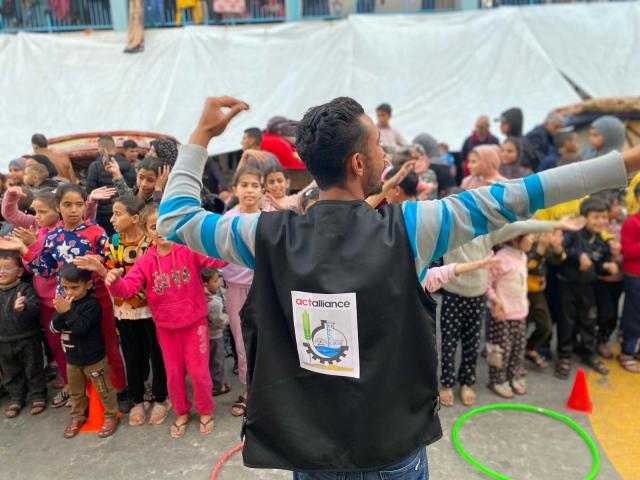More than 100 days into the conflict, most of the population of Gaza—2.2 million people—are at imminent risk of famine.

January 17, 2024, marked the 100th day of Israeli bombardment and ground operations in Gaza. The United Church of Canada continues to call for
- an immediate permanent ceasefire
- the immediate and safe release of all hostages, political prisoners, and administrative detainees
- sustained and protected humanitarian access
- independent investigations of war crimes and violations of international law, with all parties responsible being held accountable
Nader Abuamsha, executive director of Mission and Service partner the Department of Service to Palestinian Refugees Near East Council of Churches, wrote recently to General Council Global Partnership staff. He conveyed appreciation for The United Church of Canada’s solidarity and support, and noted his gratitude for the recent letter sent by the General Secretary to Prime Minister Trudeau.
Abuamsha expressed thanks for the letter’s “clear vision” about the conflict.
“Many thanks for being brave in addressing the Canadian Prime Minister Justin Trudeau with this important letter,” he writes. “Such bravery stands as a sign of life [of] our partnership, sisterhood, and brotherhood with all of you.”
The current situation
The World Health Organization (WHO) declares: “A public health catastrophe is rapidly evolving in Gaza with high levels of violent deaths and injuries, mass displacement, overcrowding, major disruption and dysfunction of the health system, and damage to water and sanitation infrastructure.”* The UN reports that more than 25,000 people have died since the start of the hostilities, about two-thirds of whom are children and women; more than 60,582 people are injured. A further 7,700 people are reported missing or buried under the rubble.
Most of the population of Gaza—2.2 million people—is at imminent risk of famine.
DSPR-NECC continues to respond to this crisis. Staff and an emergency steering committee are working under tremendous challenges and risk with whatever limited relief resources can be secured. In middle and south Gaza, DSPR-NECC operates a medical clinic, one of only four remaining centres serving a population in desperate need.
“Thirty staff have been working around the clock to serve the growing needs,” says Abuamsha.
About 1.3 million people are forcibly displaced to Rafah, which previously was home to 250,000. DSPR extended use of its offices to increase capacity for needed clinical services. Since it was reopened in December 2023, the clinic serves more than 400 patients every day, providing dental, maternal, and child healthcare and psychosocial support; offering medicine and distributing hygiene kits when available; and offering primary health care, in close liaison and coordination with the UN health cluster and the WHO in Gaza.
Last week, DSPR delivered 11 pallets of single-serve milk boxes that were included in one of the limited humanitarian shipments permitted into Gaza; DSPR staff distribute the milk boxes to children, all of whom are in desperate need. With needs constantly changing, this supplements nutrition in a limited way for children facing chronic food insecurity.
The Christian community in Gaza
DSPR colleagues report that some 800 members of the Christian community in Gaza remain in refuge in the Holy Family Catholic Church and the St. Porphyrios Orthodox Church. Over Christmas, DSPR coordinated and delivered food parcels with the Jordanian Hashemite Charitable Organization (JHCO) to relieve the internally displaced people who seek refuge in the churches.
“The needs are beyond belief, the resources are limited and hard to find, and the teams on the ground are exhausted, working in extremely unsafe and hard conditions but determined to serve this noble mission,” said Abuamsha, adding that staff in the Rafah Clinic extended their working hours to respond to the growing demand in the very crowded clinic.
When he saw the crowds, he had compassion for them because they were harassed and helpless, like sheep without a shepherd. Then he said to his disciples, “The harvest is plentiful, but the laborers are few.” (Matthew 9:36‒37, NRSVue)
*ReliefWeb, oPt Emergency Situation Update 20 (As of 11 January 2024 at 13:00), accessed January 17, 2024.